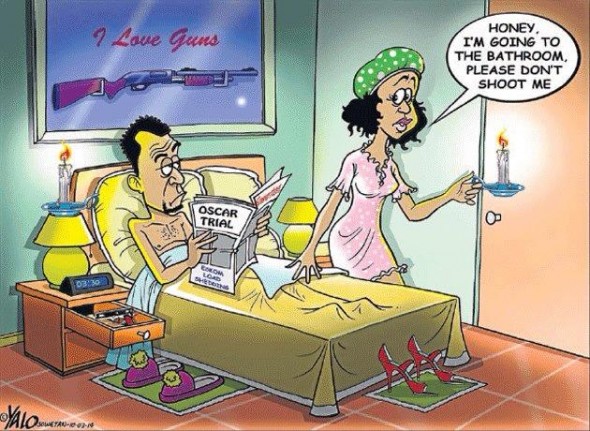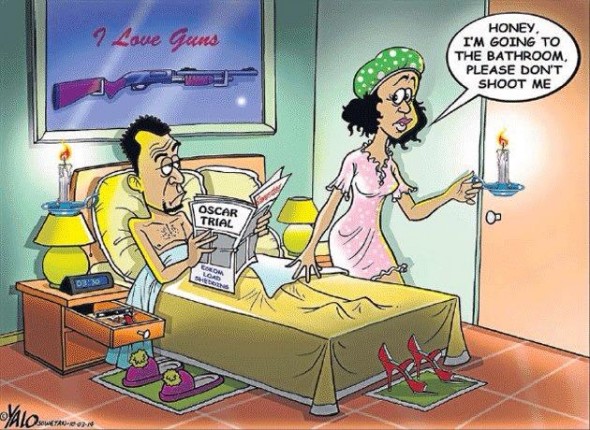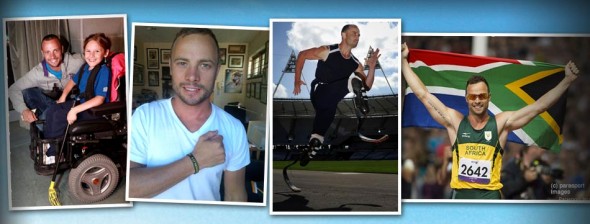
An Open Letter to Oscar Pistorius
My dear Oscar, Your freedom of access to newspaper articles and the internet doubtless leaves you somewhat bemused by your precipitous fall from grace in the eyes of an erstwhile adoring public. The reasons for this may at first blush appear obvious, but I would venture to suggest that these are as multi-faceted and as […]

My dear Oscar,
Your freedom of access to newspaper articles and the internet doubtless leaves you somewhat bemused by your precipitous fall from grace in the eyes of an erstwhile adoring public. The reasons for this may at first blush appear obvious, but I would venture to suggest that these are as multi-faceted and as complex as we the citizens of this beautiful land.

We South Africans don’t like to admit it – rarely to ourselves and certainly never in public – but we share something in common with our Australian friends: we labour both under something of an inferiority complex, a condition historically turned by both cultures to our considerable advantage, a springboard that’s driven us to feats of heroic proportions on sports field and battlefield alike. Say of us what you will, we’re a gritty bunch with a burning ambition to show the world the middle finger.
The Australians have of late achieved more success than we – not because they’re smarter or better, but because they rejoice in a situation somewhat less complex and fraught. As a nation, we’ve seen our fair share of changing fortune: pariah one moment; darling of the world’s media in the heady days of the post-apartheid nineties; thrust once more into the bleak pit of despair as the flower of our promise began to wilt and fade beneath the crushing weight of crime and corruption.
And then you came along.…exploding onto the world stage in a display of courage and speed that caught our imagination, took our collective breaths away and united us, however tenuously, in our shared pride in both you and our country.

In you we saw and celebrated the very best of ourselves: the fighting spirit, the indomitable courage, the victory of the underdog against all odds. Your success was our success as you took on and defeated not only the best of your fellow handicapped athletes but a great many able-bodied world-class athletes besides. You were the mirror in which we saw ourselves reflected, standing tall and proud once more. With you we climbed Mount Olympus as you carried the dreams and aspirations of a nation on your back.
And then, in a shattering, explosive moment the fairy tale was over as we gaped in shared disbelief! Some would argue the signs were always there: the flashes of petulance; the hints of barely-controlled anger; the sense of self-entitlement; a love of guns… If indeed, other than with the benefit of hindsight, any of these were ever in any way evident to the man in the street, they were lost in the dazzle of your charisma.
We will never know what drove you to discharge the bullets that ended not only Reeva’s life but yours as you know it: was it, as some would have us believe, a display of hubris – the ultimate exhibition of entitlement and self-righteous rage – or just the panicked response of a frightened, insecure young man who despite his success on the sports field never quite believed his own advance publicity? It has been said that “whom the gods would destroy, they first make mad” and, mindful of this, I cannot but wonder if the very essence of your success – the all-consuming fire that drove you to achieve incredible results against seemingly insurmountable odds – ultimately burned too bright.
Is it any wonder that we find ourselves conflicted: where in you we once saw the best of us, we now fear that we may see the worst for, who knows; perhaps we too might be capable of similar action given the right mix of circumstance.
There is no question that you took an innocent life and forever changed countless other lives in ways far greater than you or they can ever imagine. Whether you did so in anger or as the result of a truly horrific lapse of judgement is a matter for the Court to decide. Irrespective of the decision, justice demands that time be served and we as law-abiding citizens expect no less for to do so would be to condone our own weaknesses.
You could do worse than take the opportunity thrust on you by your incarceration to reflect on the emotions and actions, known only to you and your Maker, which brought you to this juncture. If these were indeed the result only of a combination of fear and bad judgement I pray that if you have not already done so you find both the humility and grace to not only feel guilt but also, with time, forgiveness. If, on the other hand, your actions were dictated by rage and an overweening sense of entitlement, I hold out little hope for your rehabilitation and pray that a lengthy period of incarceration will serve not only to give Reeva’s family a sense of justice served, but also to protect other defenceless women against the brunt of your anger.
In the harshest court of all – that of public opinion – you have already been found wanting, and its sentence, unlike that of the criminal courts, will be served out for the rest of your days. A notoriously fickle and unforgiving lot – no doubt a product too of our insecurity – we South Africans raise our heroes to Olympian heights but heaven forbid that these gods be found to have feet of clay. Forgive us if we judge you harshly, but not to do so would be to find ourselves wanting – not only in our own eyes but in those of a watching world. Not to do so would be to accept and condone the demons within ourselves and to remove all hope for our future as a decent, civilised, and peaceful society.
That I am neither by training nor character suitably qualified to pass judgement on you is something for which I am deeply grateful, for who can know or fathom that which moves a man to take an innocent life, throwing away in the process and at the pinnacle of success a lifetime of achievement, sweat and courage! Were it otherwise I would for once hope to be found at a loss for words…
Sincerely yours,
Paul Christie, Durban